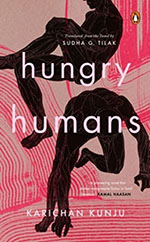Karichan Kunju’s stormy social realism novel first published in Tamil as Pasitha Manidham in 1978 can be enjoyed today by non-Tamil readers in its English avatar. Translated into English as Hungry Humans by Sudha G Tilak, the novel within 264 pages and a well-appointed glossary at the back, works for the reader as a social commentary and as an incisive but dispassionate observation of human nature. The early twentieth century positioning of the novel about the social mores transacted in and around the villages of Thanjavur in Tamil Nadu and in particular of Kumbakonam, turns the gaze inwards to truths common to all human beings.
The story is about two boys, Ganesan and Kitta, who in their parallel lives suffer the broken-ness of spirit from childhood to adult life. For Ganesan the agony of being alone in the world on account of his being an orphan, and, for Kitta, the grinding poverty of his mother’s home, make them hunger after lust, power and pelf. Experiences of predatorial patronage of wealthy men for sexual favours, of women willing to surrender to them the rights to their bodies, of training the male gaze to exploit women’s bodies, of spiritual emptiness once these hungers are satiated…these are what Ganesan and Kitta go through along with the marauding effects of disease and moral vacuousness. Vicariously, the novel through these experiences opens up the existential question in the minds of the protagonists and the reader as to what is true fulfilment in the material world. Although a little contrived, the novel in the concluding lines provides an answer for a way out of this quagmire of hunger that like a wild river devours and is devoured.
Continue reading this review

